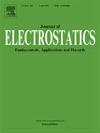摩擦电系列产生的同时水脱湿固体
IF 2.1
4区 工程技术
Q3 ENGINEERING, ELECTRICAL & ELECTRONIC
引用次数: 0
摘要
大多数固体在被纯水脱水时具有负的静电荷,在疏水材料上具有更强的电荷。研究表明,当对聚合物载玻片同时从一池纯水中取出时,疏水性较强的载玻片带负电荷,而疏水性较弱的载玻片带正电荷。不同聚合物材料组合的充电极性与摩擦电系列紧密一致。疏水性较强的载玻片的负电荷可以解释为水脱湿充电,而疏水性较弱的载玻片的正电荷可归因于偏液接触充电。基于这些发现,提出了一种非摩擦固体绝缘体接触充电机制,该机制是由分离过程中吸附水半月板的不对称脱湿驱动的,这为常见的摩擦电荷特性提供了统一的解释。本文章由计算机程序翻译,如有差异,请以英文原文为准。
Triboelectric series generated by simultaneous water dewetting of solids
Most solids acquire a negative electrostatic charge when dewetted by pure water, with stronger charging on more hydrophobic materials. Here it is shown that when pairs of polymer slides are simultaneously withdrawn from a pool of pure water, the more hydrophobic slide charges negative, while a sufficiently less hydrophobic counterpart charges positive. The polarity of the charging for different polymer material combinations closely aligns with the triboelectric series. The negative charging of more hydrophobic slides is explained by charging by water dewetting, while the positive charging of the less hydrophobic slide is attributed to biased liquid-contact charging. Based on these findings, a non-frictional solid insulator contact charging mechanism is proposed, driven by asymmetric dewetting of adsorbed water menisci during separation, which provides a unifying explanation for common triboelectric charging characteristics.
求助全文
通过发布文献求助,成功后即可免费获取论文全文。
去求助
来源期刊

Journal of Electrostatics
工程技术-工程:电子与电气
CiteScore
4.00
自引率
11.10%
发文量
81
审稿时长
49 days
期刊介绍:
The Journal of Electrostatics is the leading forum for publishing research findings that advance knowledge in the field of electrostatics. We invite submissions in the following areas:
Electrostatic charge separation processes.
Electrostatic manipulation of particles, droplets, and biological cells.
Electrostatically driven or controlled fluid flow.
Electrostatics in the gas phase.
 求助内容:
求助内容: 应助结果提醒方式:
应助结果提醒方式:


